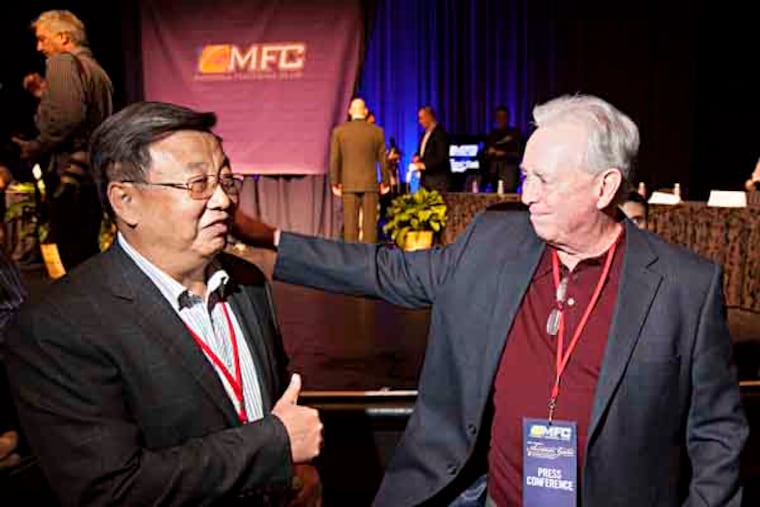Local investors taking arena football to China
In the United States, arena football has never captured the fan loyalty - or dollars - that the National Football League commands.

In the United States, arena football has never captured the fan loyalty - or dollars - that the National Football League commands.
So why would it be different in China?
Two reasons, says a group of Philadelphia investors embarked on a $20 million project to take Philadelphia Soul-style arena football to China.
First, they say, Chinese will appreciate "American football," but they won't know the difference between arena football and NFL-style play. Second, the alternatives are dull, dull, dull.
"On a Saturday afternoon, what is a Chinese person going to watch on television," asked lead investor Martin Judge Jr., an investor in the Soul. "Ping-Pong. Badminton. Cricket - that takes 24 hours to play. There's nothing exciting.
"Everyone," he said, "loves football."
What everyone really loves is the potential to snag even the tiniest percentage of the increasingly affluent 1.35 billion-person Chinese market - the home of nearly one in five members of the world's population.
The "they" includes a cast of well-known Philadelphia names - former Eagles quarterback and NFL TV and radio analyst Ron Jaworski; Dick Vermeil, the former Eagles coach; and Pete Ciarrocchi, owner of the Chickie's & Pete's chain.
Quarterbacking the entire venture is Judge, 69, a red-faced Irishman who got kicked out of Catholic school in Pennsauken, and who got into his line of business almost by accident.
In 1972, Judge started the Judge Group Inc., a Conshohocken-based head-hunting and staffing company, bankrolled with a $2,000 loan from his father, a blue-collar plant foreman at Rohm & Haas.
Judge Group once traded on the stock market but is now privately held. Annual revenue, Judge said, tops $350 million. In 2008, Judge opened a staffing business in China.
Comcast sports broadcaster Lou Tilley, whose media company produces Philadelphia Soul arena games, picks up the story:
"[Judge] got the scent. Since he was already doing business on the ground [in China], he said, 'I want to take football to China,' " Tilley said.
Judge kicked in $5 million as part of the U.S. crew, which owns 49 percent. China business groups, including Judge of China, own a 51 percent stake in the company, AFL Global L.L.C. They have acquired the Chinese franchise rights from the Arena Football League, headquartered in Chicago.
A few weeks ago, Judge was squiring his two Chinese partners, Hua "David" Wu and Hong Gang, around Philadelphia.
They attended the Maxwell Football Club awards March 2 in Atlantic City, an event that moved Wu, a former sports reporter in China, to tears.
"Here football is not just a sport," Wu said, as Gang translated. "It's a way of life. How can we take this passion and this spirit and move it to China?
"Sports is a very good way for China to know the world," Wu said.
Gary Morris, president of Judge of China, thinks that part of the sport's appeal in China will be that it comes from the United States.
"Anything they see Americans do, they want. They want our music, all of our brands," he said.
Judge said they already have potential takers for six pro-team franchises in China for tens of millions each.
Inspiring Judge and his investors has been the success of the Chinese Basketball Association.
"It is certainly true that they are getting richer in China and they have a lot of money to spare for entertainment and sports," said Yuhua Wang, an assistant political science professor at the University of Pennsylvania's Center for East Asian Studies.
But Wang isn't sure arena football will mimic basketball's appeal. The Chinese, he said, prefer sports that they are already good at - basketball, soccer.
"People in [the U.S.] like football and baseball," Wang said. "They have watched for generations and they know the rules. [Chinese] don't know the rules [of football]."
To deal with that issue, the investors are starting at the college level, with a group of past and current arena and college coaches heading to Beijing Sports University in May to train Chinese college coaches in the game. College play will begin shortly after that in a six-college league. Then, the investors hope to establish six city teams for a pro league.
In China, the arena football company will be known as Ganlan Media International - which translates, oddly enough, into Olive Media International.
Why olive?
To the Chinese, that's what our familiar laced pigskin resembles.